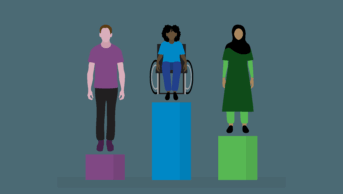
Shutterstock.com
At the Royal Pharmaceutical Society’s (RPS’s) 2022 annual conference, held on 11 November 2022, Sir Michael Marmot, director of the UCL Institute of Health Equity, laid down a challenge for pharmacy in his keynote address.
The sector had to work out how it would “react to the challenges I am about to lay out” on health inequality, he said, and do the “heavy lifting”. Why treat people and “send them back to the conditions that made them sick?” he asked.
It remains an important question and one that will come to define the recovery from the COVID-19 pandemic. In 2020, there was a gap of nearly ten years between life expectancy in England’s most and least deprived communities, with evidence now indicating that this differential may have grown in recent years.
Although there have been many examples of the health service innovating to provide targeted support for more deprived communities during the pandemic, COVID-19 has had a much greater impact — both indirectly and directly — on people who belong to ethnic minorities, those with a disability, women and the LGBTQ+ community.
Big or small, local or national, tackling geographical, socioeconomic, institutional or cultural barriers — we would like to hear about your project
The impact has been profound. For instance, one study published by researchers at the Imperial College Business School in July 2022 showed that people from ethnic minority groups, as well as those living in England’s poorest areas, experienced the most disruption to hospital care from cancelled and delayed hospital appointments during the COVID-19 pandemic.
In England, there is a new programme designed to tackle this problem. The NHS England ‘Core20PLUS5’ programme will invest £4.2m, distributed across all 42 integrated care systems, to drive action on healthcare inequalities for the most deprived 20% of the national population and others from particular groups, such as: ethnic minority communities; people with a learning disability or autism; and people with multiple long-term health conditions.
But is this comparatively small amount of money, spread across the whole country, likely to engender major change?
In England and Scotland, health service leaders have been urged to be more ambitious when it comes to tackling health inequalities and Sir Michael is correct that pharmacy can play an important role in this.
As outlined in an RPS position paper on health inequalities, published on 11 January 2023, pharmacies provide accessible health services, including being located in areas of higher deprivation, which can put them at the front line of improving inequalities.
For example, the community blood pressure checking scheme in England was listed under a range of ‘high-impact interventions’ in December 2022 by NHS England. Pharmacies have also shown tangible results by overcoming barriers to COVID-19 vaccination in particular communities.
However, this role is under threat, as we reveal in our investigation that looks at the impact of pharmacy closures on health inequalities. Pharmacy teams have to be supported and adequately resourced to play this role.
This subject is an area that The Pharmaceutical Journal will be exploring in 2023. We have already published a special episode of the PJ Pod visiting pharmacists making a real difference in their local areas. But we also want to hear from you.
We would like to invite any UK pharmacy professional to let us know what they are doing in their local area to narrow health inequalities. We aim to publish a series of case studies that show the breadth and quality of work that is ongoing in pharmacy to narrow these gaps, in order to support a wider rollout and greater funding for the sector to tackle this problem.
Big or small, local or national, community or hospital, tackling geographical, socioeconomic, institutional or cultural barriers — we would like to hear about your project.
Health inequality can never be justified and tackling this issue is becoming the challenge of our age. We hope to play our part on meeting Sir Michael’s challenge, we hope you will too. PJ
Send us your examples
Please email us with a brief description of any initiative you are involved in that aims to narrow health inequality at: editor@pharmaceutical-journal.com
We are interested in any scheme, big or small, targeting any population group and from any sector of pharmacy. In your email, please outline the project, who was involved, any results (no matter how provisional) and anything else you would like to say. An editor from The Pharmaceutical Journal will be in touch to discuss next steps.
This call for papers is open until 30 June 2023.


